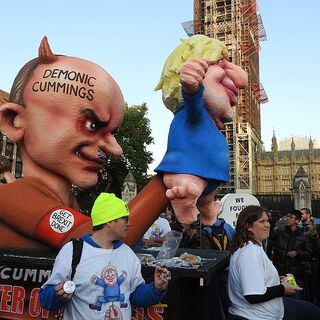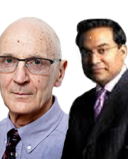Psychology
Can Dominic Cummings Psychology Explain Lockdown Violations?
Why political elites flout the very same lockdown rules they impose on others.
Posted May 26, 2020
Under the headline, "Top officials around the world keep getting caught breaking lockdown rules," The Washington Post lists several recent examples, including Austrian President Alexander Van der Bellen apologising for violating his government’s own rules by staying out significantly longer than was allowed. Another apology was recently issued after Polish Prime Minister Mateusz Morawiecki sat too close to several non-family members in a restaurant, while no one wore a mask.
The Washington Post also cites the recent example of UK epidemiologist Neil Ferguson, a key senior adviser to the British government on its coronavirus response, who resigned after it was revealed that he broke lockdown edicts when a woman described as his lover visited him at home. Yet it was Ferguson’s own research which drove official policy to adopt strict isolation measures.

Can psychology explain this pattern of the otherwise politically astute and successful, breaking rules so clumsily and obviously, they then face the career-ending glare of media and public scrutiny?
Is it simply the case that the pandemic inadvertently revealed something many already suspected, political elites believe there is one rule for them, and another for the rest of the population? Appearances of solidarity are deceptive, and basically no matter what the propaganda slogans say, we are not "all in it together."
The latest possible example of the syndrome is Dominic Cummings, (special adviser to UK Prime Minister Boris Johnson) who recently attempted to defend his apparent breaking of lockdown rules. In late March, he drove 260 miles from London to Durham with his ill wife and their young son, an apparent direct contravention of the government’s key message, to stay home, especially if coronavirus symptoms are present.
Will these incidents inflict a serious emotional rift between the public and governments wherever this happens, puncturing national unity, or trust in instructions and messages from leaders, so essential in fighting the pandemic?
The grave danger with the special adviser to the UK Prime Minister defending apparently breaking lockdown rules in late March and early April, is that it plays directly to the question of whether the UK, as well as the rest of the world, is being governed by political elites, who are never committed to the rules they issue, while expecting the lower orders to follow them.
Conservative MP David Warburton, as reported in The Guardian Newspaper, described how his father had died alone as a result of following the rules, and declared Cummings’s actions gave the impression of “double standards."
He told the BBC: “People have made sacrifices, this is a difficult time … in those sacrifices there really hasn’t been the choice to use instinct. Instinct hasn’t really been part of it. We’ve been tasked with following regulations laid down by the government.”
This goes to the heart of the issue from a psychological standpoint. Is it the case that the political elite in the UK, and maybe elsewhere, rely on instincts when it comes to ethical behaviour (Dominic Cummings explained that he didn’t feel the need to consult with, the Prime Minister, possibly suggesting he thought that his instincts would be shared by his boss), which is at variance with the instincts of the public?
Because instincts can operate at such a basic level, psychologically, our ruling elite may not even be fully aware of the way in which they differ fundamentally from the rest of us.
Dominic Cummings did seem bewildered during and after a recent unprecedented press conference, by the strength of reaction to his attempted defence. This is all the more surprising for someone who is supposed to have masterminded the electoral success of the current government.
Dr Nicholas Allen, reader in Politics at Royal Holloway College, University of London, and Professor Sarah Birch at Kings College London have published academic research which has found that candidates for parliamentary office in the UK display significantly more tolerance of ethically dubious behaviour than members of the public. Within the elite category, elected MPs exhibit more permissive ethical standards than those candidates who are unsuccessful.
The study entitled, "On either side of a moat? Elite and mass attitudes towards right and wrong" included a reference to a previous political scandal where members of the UK parliament appeared to be abusing their parliamentary expenses allocation by for example paying for the purchase of a duck house and the cost of cleaning a moat.
The study found that sitting MPs and Conservatives (both in and out of the UK House of Commons) appear to be significantly more tolerant, compared to the public, of ethically questionable behaviour. This had also been found in previous research conducted in the late 1980s. The authors conclude it appears that "there is something about the ideology of the modern Conservative Party – or some other shared characteristic of Tory politicians – that makes its MPs and prospective MPs more tolerant of ethical deviance than other political belief systems."
The study, published in the academic journal, European Journal of Political Research, points out that one way of thinking about corruption is that it falls into "black," "white," and "grey" categories. "Black" corruption refers to behaviour where both the public and political elites agree are clearly improper. ‘White’ corruption, in contrast, refers to acts generally tolerated by both groups.
However, crucially, between "black" and "white," lies "grey" corruption, which elicits different reactions from elites and citizens. Perhaps this is the crucial territory where Dominic Cummings’ lockdown behaviour resides.
Political scientists contend that a majority of one group (the public) might regard behaviour lying in the "grey" area as being extremely corrupt, whilst a majority of the other (eg political elites) might genuinely regard it as being only marginally corrupt, or else be ambivalent about its significance.
Nicholas Allen and Sarah Birch’s research involved putting several possibly morally questionable political acts to the 2005 British Representation Study (BRS), a survey of all major-party candidates, including incumbent MPs, conducted at the time of the 2005 general election, as well as a representative survey of the British adult population conducted by YouGov in April 2009.
Whilst there was agreement between political elites and the public in several areas on what counted as unacceptable corruption, significant gaps opened up between the groups on some situations.
These included scenarios with the chair of a company being given an honour in return for that company making a big donation to their political party, a minister using influence to benefit a firm in his or her constituency, and a Member of Parliament being retained to arrange meetings and dinners in the House of Commons. In response to these particular scenarios, large majorities of the public declared this behaviour corrupt, while much smaller proportions of candidates and MPs said the same.
Nicholas Allen and Sarah Birch point out that theirs, and previous research, has established that there is a big overlap in agreement between political elites and the public in many areas of what counts as corruption, or unethical behaviour. It is only in certain specific areas that gaps begin to open up. It is not the case, therefore, that political elites could be generally described as generally morally bankrupt.
Indeed, in some situations, political elites take some rules even more seriously than the public, often when dealing with unambiguously illegal acts.
Also, political elites are aware of the fact there will be interference in their personal lives and sacrifices as a result of entering politics; for example, previous research has found that political elites and the public agreed about what was ethical in such scenarios such as a cabinet minister not telling the prime minister about seeing a psychiatrist.
However, this research has confirmed that the moral instincts of political elites and the public do part ways in certain significant predicaments. It does appear that those are the quandaries where political elites may be more aware than the general public of ‘how politics works’, on the inside, in other words how political advantage is obtained behind the scenes, in the real world.
Political scientists refer to "volitional" failures, when individuals consciously decide to act improperly, in contrast to more ‘cognitive’ failures, when individuals believe themselves exempt from moral requirements.
It could be that the Dominic Cummings incident is more an example of a "cognitive" failure in that, according to this research conducted by Nicholas Allen and Sarah Birch, his world outlook is shaped by his background in politics, leading him to a different understanding of what to do when the situation is more ambiguous, at least in his eyes.
Nicholas Allen and Sarah Birch conclude their results support their theory that politicians as a class are more tolerant of ethically dubious behaviour when there is ambiguity. It might be that the journey to power warps ethical standards.
The theory that political elites suffer "cognitive" failures is hugely significant to the current predicament of Dominic Cummings and the government because it also raises the question of when our leaders are deciding to impose severe lockdown rules on a country, causing massive public suffering, do they do so believing the same rules will apply to them?
If our political elite believed harsh restrictions also applied to them equally and were more aware of the severe personal implications and consequences, might they have actually come up with a different policy?
Dr. Peter Bruggen passed away in 2018. While this article was written by Dr. Raj Persaud, Dr. Bruggen's name is retained biographically as a tribute to his contributions overall.
References
On either side of a moat? Elite and mass attitudes towards right and wrong. NICHOLAS ALLEN & SARAH BIRCH European Journal of Political Research 51: 89–116, 2012




